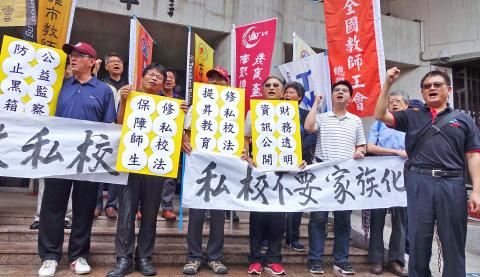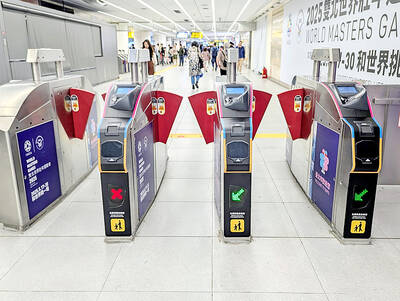Private universities should be required to include public interest and labor advocates on their boards of directors to prevent illicit asset transfers as many schools face closures or mergers, the National Federation of Teachers’ Unions (NFTU) said yesterday.
About 20 NFTU members gathered outside the Legislative Yuan, shouting for “vultures” to be removed from university campuses as hearings were held on possible revisions to the Private School Act (私校法).
The union also called for cutting the proportion of donor relatives allowed on boards from one-third to one-fifth, publishing board meeting minutes and forbidding board members from sending representatives to board meetings in lieu of personal attendance.

Photo: Chang Chia-ming, Taipei Times
“When we look at the shady dealings and corruption which have gone on at private universities, it is clear that the current law is too loose and allows them to operate opaquely,” NFTU vocational and trade schools committee chairman Yu Jung-hui (尤榮輝) said, referencing a number of scandals that have hit the sector, including kickbacks on school lunches, sales of board seats and diplomas and the illicit “hollowing out” of school assets to line the pockets of board directors.
“All that we are aiming at with these measures is transparency,” NFTU president Chang Hsu-cheng (張旭政) said. “Our demand is simple — we want to normalize the operation of universities and ensure that there will not be any more ‘vultures’ on campuses.”
“Even if public interest and labor advocates on university boards might not be able to entirely prevent the ‘hollowing out’ of schools, they would definitely greatly reduce the frequency and extent of the practice,” he said, adding that the measure would serve as an intermediate step to preserve the assets of failing schools prior to government takeover.
Substantial closures and mergers are expected in the near future because of falling student numbers as a result of low birth rates.
Unions say that the assets of failed private universities should be liquidated by the government and reinvested in education, because the original private donations were intended for educational use, while many schools were built on cheaply acquired public land and have received substantial government subsidies.
“There would be a huge difference between the oversight of public interest and labor directors and that currently provided by the Ministry of Education,” Chang said. “When looking at a purchase, a director could determine whether the price was reasonable, while the ministry today only looks at whether the purchasing process was legal.”
Kick-backs from overpriced contracts are a key means to illicitly “hollow out” school assets, he said, adding that most directors boast close ties to donors and their families, creating a temptation to look after donors’ interests at the expense of the university.
NFTU organization department head Hsu You-jen (許又仁) said it it is currently almost impossible for the union to gain access to board meeting minutes because they are not even available to the executive boards charged with running everyday school operations.

A magnitude 6.4 earthquake struck off the coast of Hualien County in eastern Taiwan at 7pm yesterday, the Central Weather Administration (CWA) said. The epicenter of the temblor was at sea, about 69.9km south of Hualien County Hall, at a depth of 30.9km, it said. There were no immediate reports of damage resulting from the quake. The earthquake’s intensity, which gauges the actual effect of a temblor, was highest in Taitung County’s Changbin Township (長濱), where it measured 5 on Taiwan’s seven-tier intensity scale. The quake also measured an intensity of 4 in Hualien, Nantou, Chiayi, Yunlin, Changhua and Miaoli counties, as well as

Credit departments of farmers’ and fishers’ associations blocked a total of more than NT$180 million (US$6.01 million) from being lost to scams last year, National Police Agency (NPA) data showed. The Agricultural Finance Agency (AFA) said last week that staff of farmers’ and fishers’ associations’ credit departments are required to implement fraud prevention measures when they serve clients at the counter. They would ask clients about personal financial management activities whenever they suspect there might be a fraud situation, and would immediately report the incident to local authorities, which would send police officers to the site to help, it said. NPA data showed

ENERGY RESILIENCE: Although Alaska is open for investments, Taiwan is sourcing its gas from the Middle East, and the sea routes carry risks, Ho Cheng-hui said US government officials’ high-profile reception of a Taiwanese representative at the Alaska Sustainable Energy Conference indicated the emergence of an Indo-Pacific energy resilience alliance, an academic said. Presidential Office Secretary-General Pan Men-an (潘孟安) attended the conference in Alaska on Thursday last week at the invitation of the US government. Pan visited oil and gas facilities with senior US officials, including US Secretary of the Interior Doug Burgum, US Secretary of Energy Chris Wright, Alaska Governor Mike Dunleavy and US Senator Daniel Sullivan. Pan attending the conference on behalf of President William Lai (賴清德) shows a significant elevation in diplomatic representation,

The Taipei MRT is to begin accepting mobile payment services in the fall, Taipei Rapid Transit Corp said on Saturday. When the company finishes the installation of new payment units at ticketing gates in October, MRT passengers can use credit cards, Apple Pay, Google Pay and Samsung Pay, the operator said. In addition, the MRT would also provide QR payment codes — which would be compatible with Line Pay, Jkopay, iPass Money, PXPay Plus, EasyWallet, iCash Pay, Taiwan Pay and Taishin Pay — to access the railway system. Currently, passengers can access the Taipei MRT by buying a single-journey token or using EasyCard,